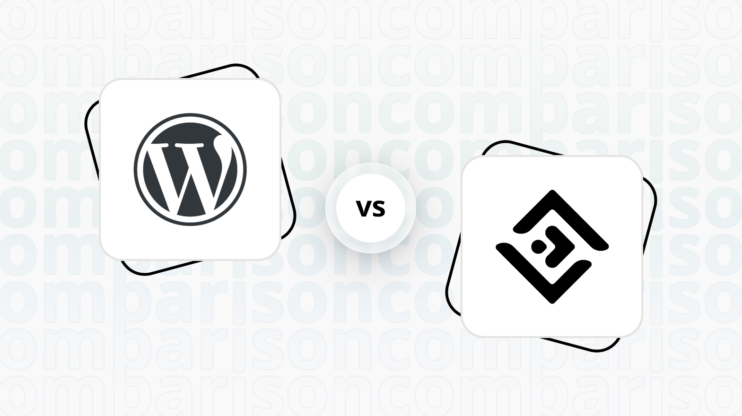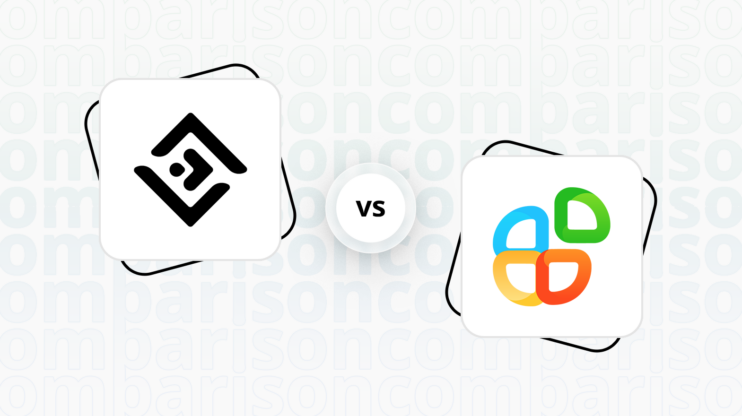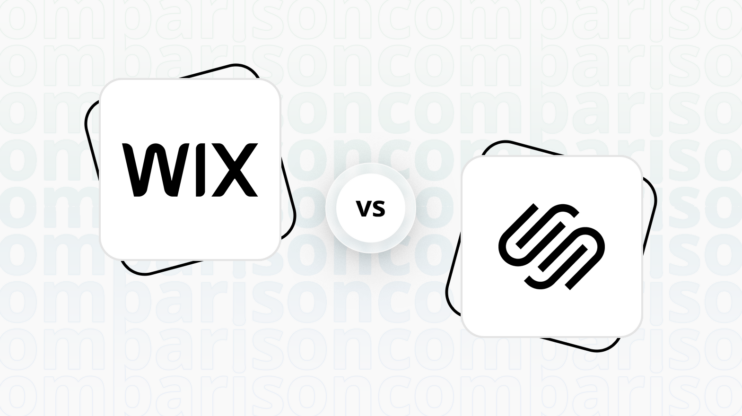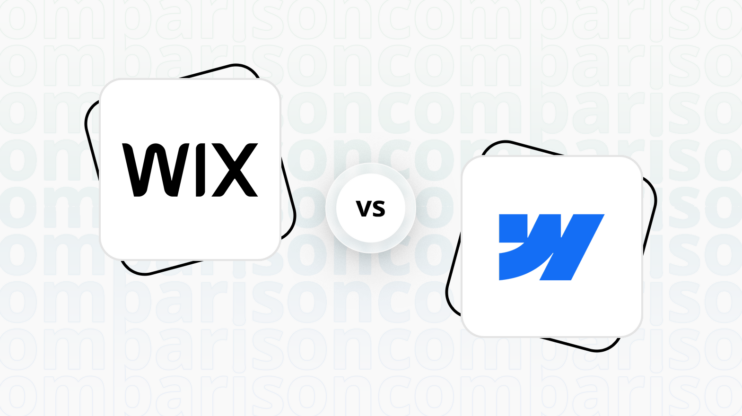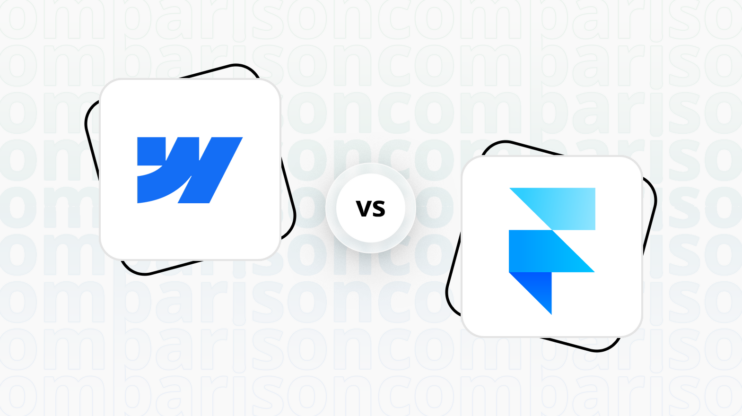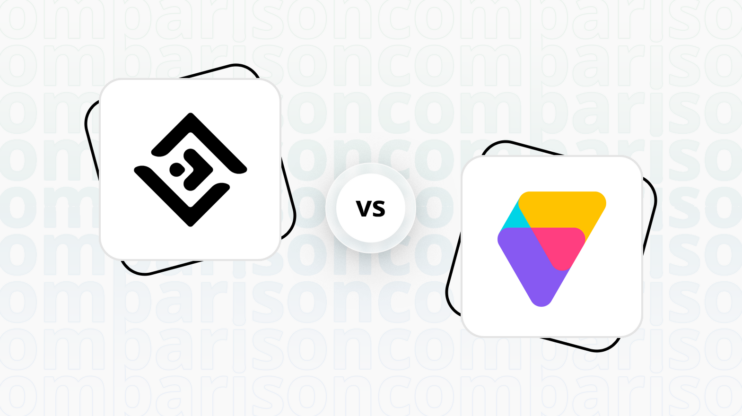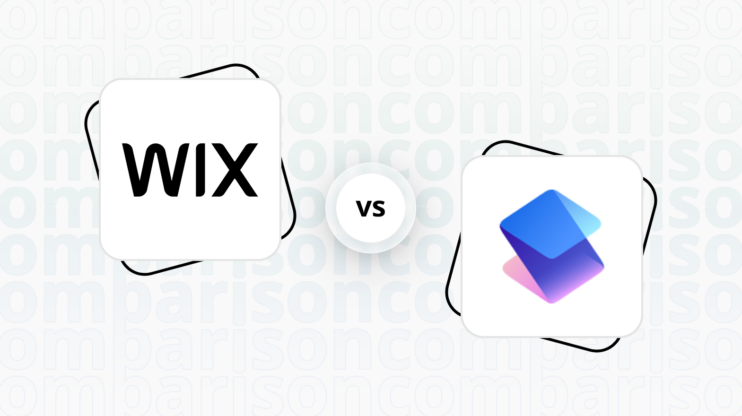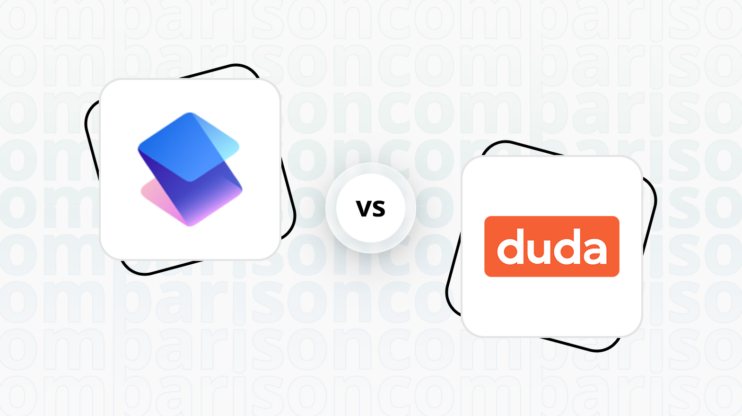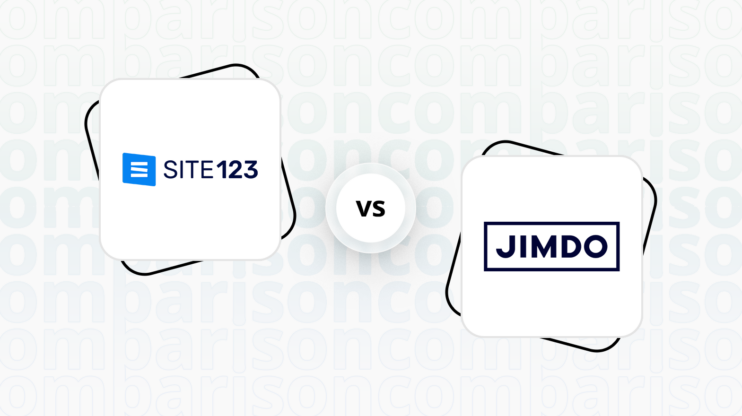Final verdict
WordPress and Appy Pie offer distinct advantages, making the choice between them dependent on the user’s specific needs.
-
WordPress (Overall Grade: 7.1/10)
excels in customization, offering an extensive range of themes and plugins that cater to a wide variety of website types. It’s particularly strong in areas like design functionalities, website editors, plugins and integrations, and marketing features. WordPress is ideal for users who require a high degree of customization and control over their website’s design and functionality. -
Appy Pie (Overall Grade: 7.2/10)
stands out for its ease of use, customer support, and built-in AI capabilities. It offers a user-friendly platform that enables quick website creation without coding skills. Appy Pie is particularly suited for individuals and businesses looking for a straightforward, efficient way to establish an online presence with minimal technical know-how.

|

|
|
|---|---|---|
|
Design functionalities & templates |
9.0 |
6.8 |
|
Ease of use |
7.2 |
8.3 |
|
Ecommerce |
8.4 |
7.2 |
|
Website Editors |
8.5 |
7.7 |
|
Product testing options |
8.1 |
8.9 |
|
Price |
5.9 |
7.4 |
|
Hosting quality |
0 |
6.9 |
|
Website speed optimization |
6.5 |
5.0 |
|
Plugins and integrations |
8.8 |
6.4 |
|
Marketing features |
8.0 |
7.5 |
|
Customer support |
5.0 |
8.2 |
|
Security |
6.7 |
7.5 |
|
AI capabilities |
6.1 |
7.2 |
|
User Management |
8.8 |
7.3 |
| Overall |
7.1 |
7.2 |
Best for ecommerce
 8.4
8.4
 7.2
7.2
Verdict
: WordPress is the superior choice for ecommerce, offering extensive customization and a wide range of features through WooCommerce. Appy Pie provides a simpler, more user-friendly approach but lacks the depth of WordPress.
-
WordPress
: With WooCommerce, WordPress becomes a powerful ecommerce platform, offering everything from multiple payment gateways to advanced SEO tools. It’s best for those who need a customizable and scalable online store. -
Appy Pie
: Ideal for beginners or those looking to quickly set up a basic online store without much customization. While it offers essential ecommerce features, it doesn’t match WordPress’s scalability or depth.
Best for informational & business websites
 9.2
9.2
 7.4
7.4
Verdict
: WordPress is the superior choice for informational and business websites, offering extensive customization and a wide range of functionalities. Appy Pie, while user-friendly and efficient for quick deployments, lacks the depth and flexibility provided by WordPress.
-
WordPress
: With a score of 9.2, WordPress stands out for its robust content management capabilities and extensive customization through themes and plugins. It’s ideal for users looking to create content-rich, highly customized websites. -
Appy Pie
: Scoring 7.4, Appy Pie offers a straightforward, no-code solution for building websites quickly. While it may not match WordPress in terms of customization and depth, it’s a solid choice for those prioritizing ease of use and speed in website creation.
Detailed comparison
Design functionalities & templates
Design FunctionalitiesRepresents how well each platform allows for creative design and customization of websites.Score Components:
- Template Variety (30%): Range and quality of design templates.
- Customization (30%): Flexibility and options for design alterations.
- User Interface (20%): Ease and intuitiveness of the design process.
- Responsiveness (10%): Adaptability to different devices and screen sizes.
- Innovation (10%): Unique design features and tools.
 9.0
9.0
 6.8
6.8
🏆
Winner: WordPress.
If you’re looking for a platform that offers extensive customization options and a wide variety of templates and designs, WordPress is the preferred choice.
WordPress offers an extensive variety of templates and designs, catering to a wide range of website types beyond just blogs or ecommerce. Its open-source nature allows for high customization and creative freedom, appealing to diverse user needs. While WordPress itself doesn’t sell premium templates, numerous third-party theme shops offer sophisticated and specialized design choices, expanding the possibilities for users.
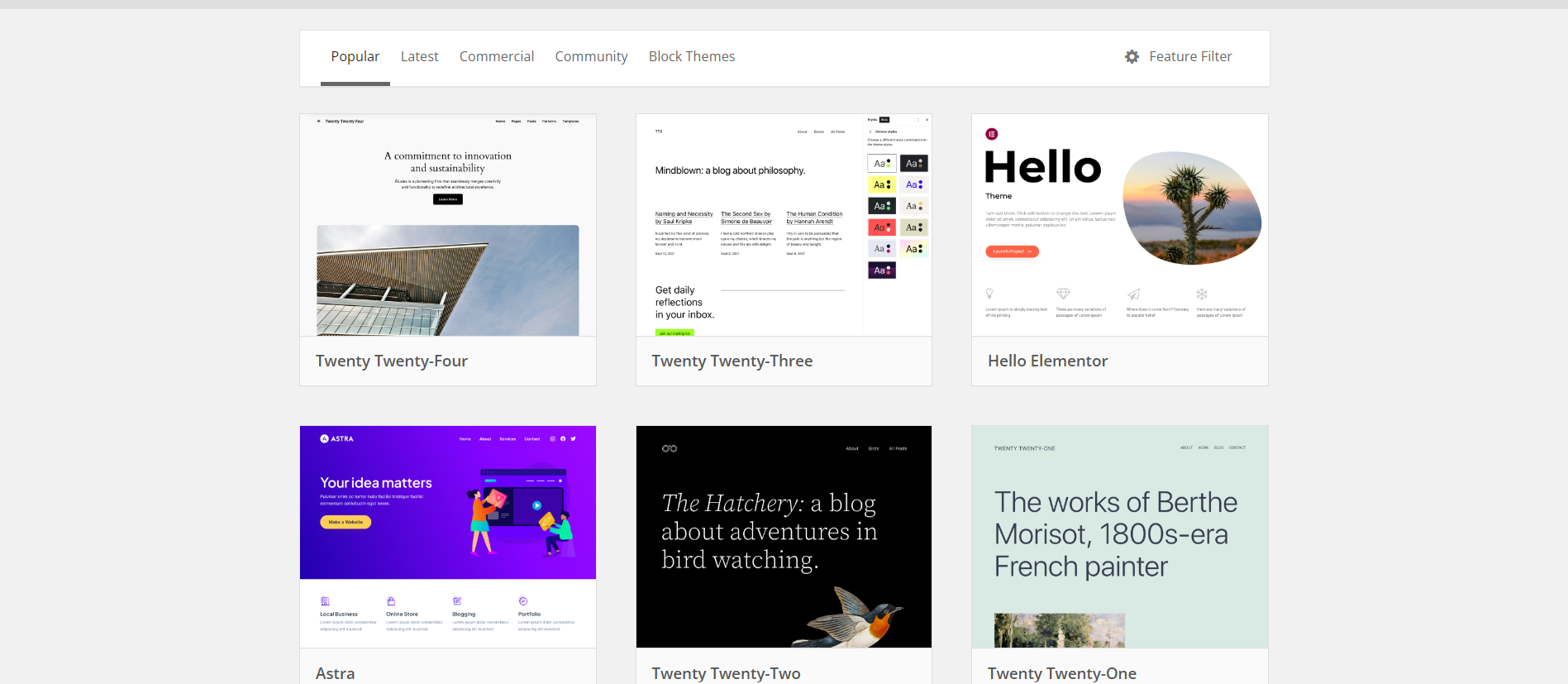

Compared to WordPress, Appy Pie offers a wide array of website templates with over 10,000 options, catering to various needs and budgets. Categorized across industries, these templates are mobile-friendly and customizable, allowing users to edit colors, fonts, layouts, and add features. The platform’s pre-designed themes, layouts, and user-friendly drag-and-drop builder enhance visual appeal and customization ease, making it accessible for users without coding knowledge.
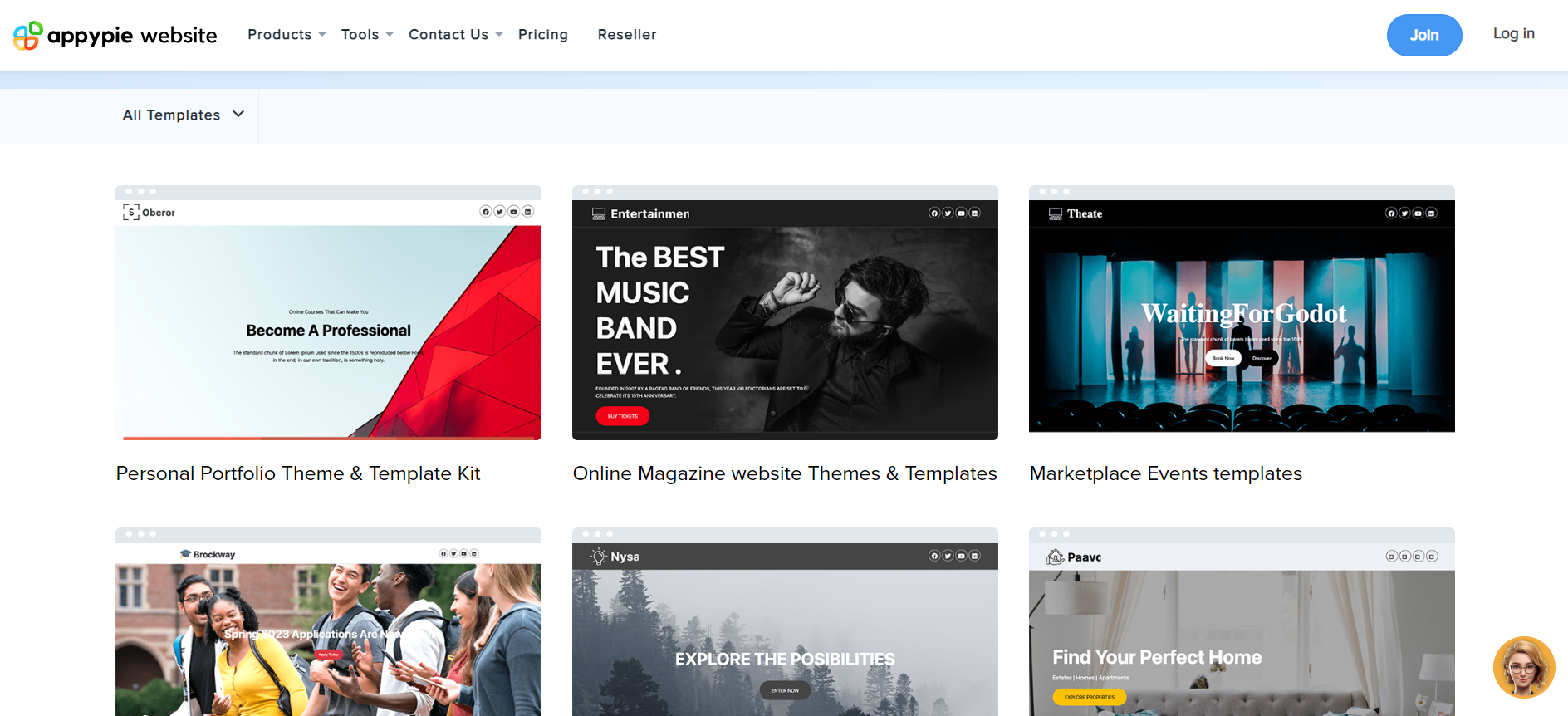

Get a head start on website creation with AI
Create a custom website tailored to your business needs 10X faster with 10Web AI Website Builder!
Ease of use
Ease of useReflects the platform’s overall user-friendliness.Score
Components:
- Learning curve (40%): Quickness and ease of getting started.
- Interface design (30%): Simplicity and intuitiveness of layout.
- User guidance (20%): Quality of tutorials and support.
- Flexibility (10%): Adaptability to various user skills.
 7.2
7.2
 8.3
8.3
🏆 Winner: Appy Pie
. With a score of 8.3, Appy Pie is acclaimed for its simplicity and intuitive design, making it highly accessible for users without coding skills. WordPress, scoring 7.2, offers great flexibility and power, but it can be less intuitive for beginners compared to simpler website builders. If ease of use is a priority, Appy Pie is the clear winner in this category.
Learning Resources
🏆 Winner: WordPress
. While both platforms offer solid learning resources, WordPress goes a step further with its wide array of detailed documentation, community forums, online tutorials, and courses, making it easier for users to learn and adapt.
For ecommerce
EcommerceMeasures the platform’s effectiveness in supporting online business activities.Score Components:
- Ecommerce themes and templates (20%): Variety and design of templates.
- Product management (25%): Ease of managing and organizing products.
- Payment options (25%): Variety and convenience of payment methods.
- Ecommerce features (20%): Features for managing an ecommerce store.
- Integration (10%): Compatibility with external e-commerce tools and services.
 8.4
8.4
 7.2
7.2
WordPress, with its WooCommerce plugin, offers a robust ecommerce solution with extensive customization options. It supports multiple payment gateways and provides tools for SEO optimization and analytics. Appy Pie, while not as feature-rich as WordPress, still offers a decent range of ecommerce features, including product and inventory management, shopping cart, multiple currencies, and promotions.

|

|
|
|---|---|---|
|
Ecommerce themes and templates |
9.2 |
6.0 |
|
Product page customization |
9.0 |
7.0 |
|
Payment processing and commissions |
7.5 |
6.5 |
|
POS capabilities |
6.5 |
6.0 |
|
Payment gateways |
8.5 |
7.5 |
|
Product numbers |
7.0 |
6.5 |
|
Additional ecommerce features |
8.0 |
7.0 |
WordPress ecommerce features:
- WooCommerce Integration
- Multiple Payment Gateway Support
- Abandoned Cart Recovery
- Ecommerce Analytics
- SEO Optimization Tools
- Extensive Plugin Ecosystem
Appy Pie ecommerce features:
- Product and Inventory Management
- Shopping Cart
- Multiple Currencies
- Promotions and Discounts
- Order Management
- Shipping Options
- Analytics
- Tax management
Ecommerce themes & templates
WordPress offers hundreds to potentially thousands of ecommerce and WooCommerce specific themes and templates, both free and premium. Appy Pie, on the other hand, offers a smaller selection of ecommerce website templates. These templates are designed to help users create online stores quickly and efficiently, without the need for coding skills.
Product page customization
WooCommerce on WordPress offers extensive customization for eCommerce product pages, balancing plugins, page builders, and custom coding. Advanced features like product tabs, upsells, and related products are customizable. Appy Pie’s Website Builder provides users with extensive customization options for product pages, enabling the creation of unique online stores or product showcases without requiring advanced coding skills.
Payment processing
WordPress doesn’t handle payments directly but offers plugin options for payment processing. Popular gateways include PayPal, Stripe, Authorize.Net, and Square. Appy Pie offers a user-friendly platform for integrating payment processing and POS capabilities into mobile apps and online stores, supporting multiple payment gateways like PayPal, Stripe, and Square for secure and versatile customer transactions.
Website Editors
Website EditorsEvaluates the platforms’ website building and editing capabilities.Score Components:
- Customization tools (40%): Range and power of editing features.
- Editor usability (30%): User experience within the editor.
- Design flexibility (20%): Freedom in layout and design changes.
- Update and maintenance ease (10%): Simplicity of updating and maintaining the site.
 8.5
8.5
 7.7
7.7
🏆
Winner: WordPress
. WordPress, with a score of 8.5, offers a user-friendly interface with block-based editing, extensive styles customization, template management, page editing/creation, distraction-free modes, versatile saving options, and accessibility for users of varying skill levels. It provides a WYSIWYG (What You See Is What You Get) interface, and changes can be applied globally, including Header and Footer templates. The editor also offers features like undo/redo, List View, Command Palette, and customization tools.
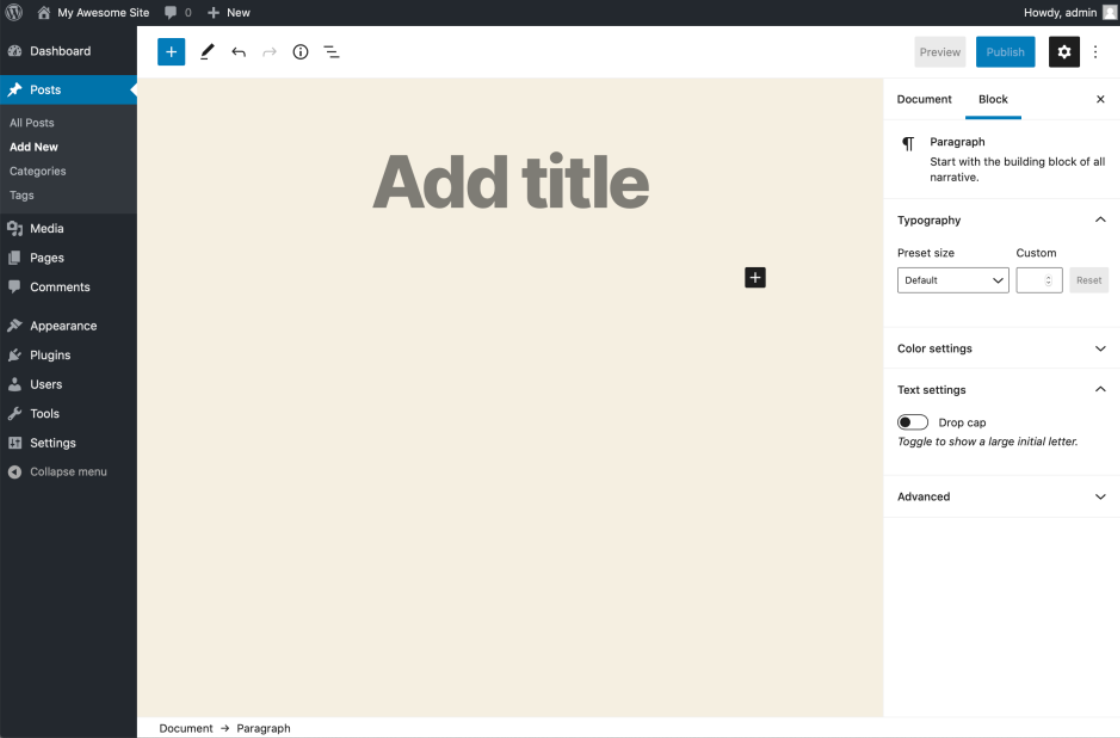
Appy Pie’s website editor, scoring 7.7, is acclaimed for its simplicity and no-code platform, making it an excellent choice for beginners looking to create websites effortlessly. It employs an AI-based approach to website creation, allowing users to develop websites without diving into coding or complex web development processes. The platform emphasizes ease of use and efficiency, offering a user-friendly experience that enables the creation of basic to more sophisticated websites within minutes.
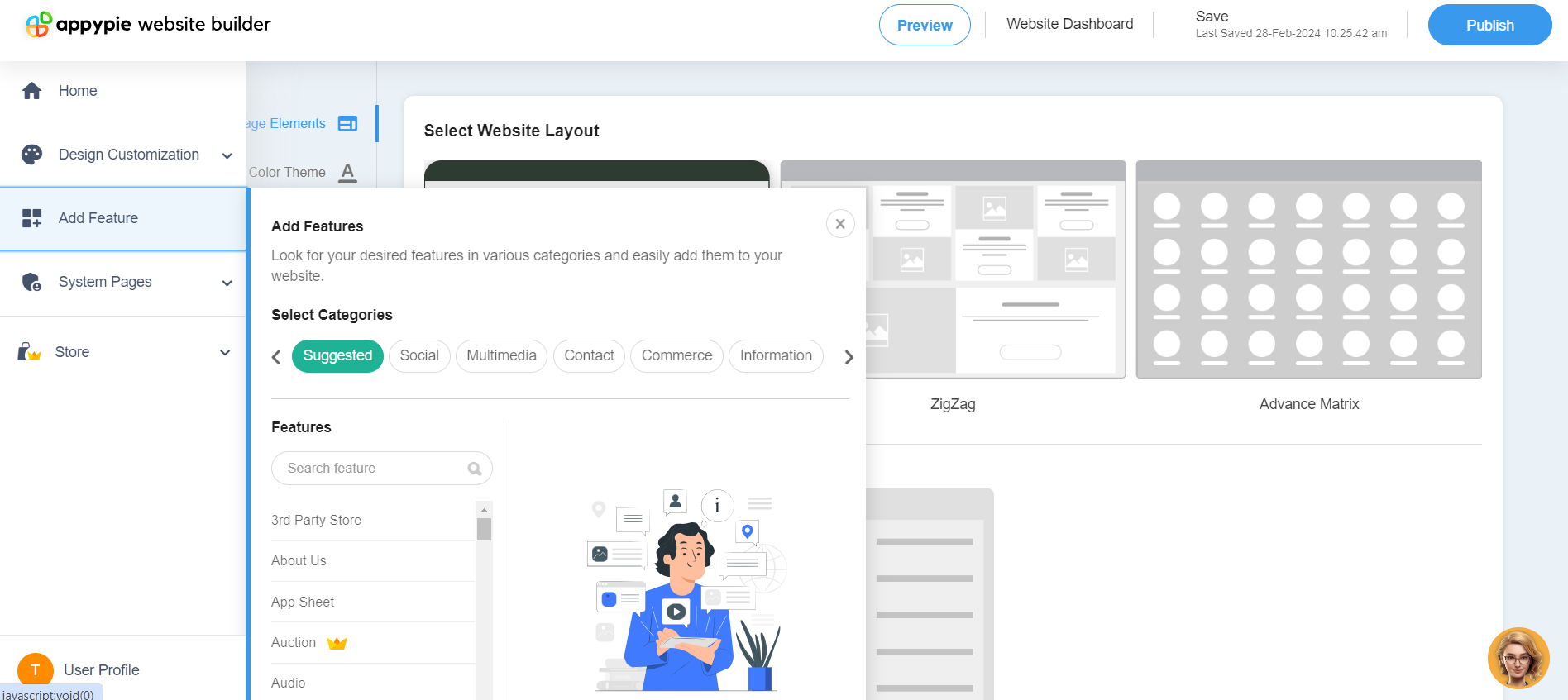
Mobile editor/app
 8.1
8.1
 5.5
5.5
🏆
Winner: WordPress
. Both WordPress and Appy Pie offer mobile editing capabilities, but they cater to different needs and skill levels. WordPress has a dedicated mobile app that allows users to manage their website on the go, including creating and editing posts, managing comments, scheduling content, and analyzing website traffic. However, it has some limitations compared to the web-based editor, including fewer advanced options, restricted code access, and limited design customization.
On the other hand, Appy Pie does not have a dedicated mobile app, but it is possible to edit Appy Pie website using the mobile browser. However, this might not provide the same level of convenience and functionality as a dedicated mobile app.
In summary, WordPress receives a higher rating due to its dedicated mobile app and the range of features it offers, while Appy Pie’s mobile editing capabilities are more limited.
Product testing options
Product Testing OptionsAssesses the options for trying out platform features before commitment.Score Components:
- Trial quality (40%): Extent and usefulness of the trial or free version.
- Feature accessibility (30%): How many features are available to test.
- Trial duration (20%): Length of the trial period.
- Ease of transition (10%): Smoothness of moving from trial to paid plans.
 8.1
8.1
 8.9
8.9
Overall Result
:
Appy Pie Wins
. Appy Pie scores 8.9 in product testing options, slightly higher than WordPress’s 8.1. While WordPress offers a free version as it is an open-source CMS, it does not provide a trial version or the possibility to test premium features. On the other hand, Appy Pie, despite not having a free version, offers a 30-day free trial during which all premium features can be tested. However, it’s worth noting that Appy Pie does not offer a money-back guarantee.

|

|
|
|---|---|---|
|
Free Plan |
Yes (open source software) | No |
|
Trial Duration |
No |
30 days |
|
Testing Premium Features |
No |
All premium features during free trial |
|
Money Back Guarantee |
Not applicable | No |
Price
PriceLooks at the cost-effectiveness and value for money of each platform.Score Components:
- Plan value (40%): What each pricing tier offers.
- Transparency and clarity (30%): Clearness of pricing structures.
- Flexibility of plans (20%): Range of options to suit different budgets.
- Hidden costs (10%): Additional expenses not included in the plan.
 5.9
5.9
 7.4
7.4
Appy Pie offers more straightforward pricing with different plans, while WordPress is free but requires separate purchases for hosting, domain, and website builder subscriptions.

|

|
|
|---|---|---|
|
Free |
Free Plan ($0/month): WordPress is open source software that is free. WordPress does not provide hosting services; so, it is necessary to purchase a domain, web hosting, and website builder subscriptions separately. While WordPress lacks built-in ecommerce, plugins like WooCommerce offer a solution. WordPress offers an extensive variety of templates and designs. WordPress lacks a built-in AI-assisted builder, but its open-source nature allows for an ecosystem of plugins and themes incorporating AI for website building. |
No offering at this amount. |
|
$10-$20 |
No offering at this amount. |
Start ($18/month): Suitable for personal projects, offering 50 GB storage and access to professional theme templates, domain connection, no Appy Pie ads, CSS & Java customization, etc. Value for price: 6.5 |
|
$30+ |
No offering at this amount. |
Grow ($36/month): Aimed at small businesses, providing unlimited storage, advanced marketing and monetizing tools, multiple payment gateways, etc. Value for price: 8.5 |
location. As a result in rare cases the prices displayed here can differ from the ones you see on their
websites.
Hosting quality
Hosting
qualityExamines the reliability and performance of the hosting solutions.Score Components:
- Uptime (40%): Consistency and reliability of website availability.
- Speed (30%): Loading times and performance.
- Bandwidth and storage (20%): Sufficiency of resources provided.
- Data centers (10%): Quality and distribution of hosting infrastructure.
 0
0
 6.9
6.9
Winner: Appy Pie
. Appy Pie offers proprietary hosting services with a 99% uptime guarantee and relies on Amazon Web Services (AWS) for its data centers. On the other hand, WordPress, being an open-source CMS, does not directly provide hosting services, and the uptime, uptime guarantee, and data centers depend on the chosen hosting provider.

|

|
|
|---|---|---|
|
Do they offer hosting? |
No | Yes |
|
Data Centers: |
Depends on hosting provider | AWS |
|
Type of hosting: |
Depends on hosting provider | Proprietary hosting service |
|
Uptime: |
Depends on hosting provider | 99% |
|
Uptime Guarantee: |
Depends on hosting provider | Yes, 99% |
Website Speed Optimization
Website Speed OptimizationEvaluates optimization of website loading timesScore Components:
- PageSpeed Score (30%): Google’s score indicating performance optimization.
- Loading Time (30%): The average time until a website is fully interactive.
- Mobile Optimization (15%): Optimization effectiveness for mobile devices.
- Resource Optimization (15%): Optimizing images, scripts, and other heavy resources.
- CDN Usage (10%): Use of CDN to enhance speed across geolocations.
 6.5
6.5
 5.0
5.0
🏆 Winner: WordPress
Both WordPress and Appy Pie do not have specific strategies for website speed optimization, but WordPress provides valuable resources for enhancing a website’s Core Web Vitals, giving it an edge over Appy Pie.

|

|
|
|---|---|---|
|
Focus |
Extensive customization options |
Quick deployment, ease-of-use |
|
Performance Tools |
Core Web Vitals, WP Rocket, Hummingbird |
Not disclosed |
|
Key Strategies |
No specific strategy, but numerous resources available |
No specific strategy, but various tools and features available |
|
Load Times |
Varies widely, dependent on optimization |
Varies widely, depending on optimization and user’s location |
|
Page Speed Scores Range |
Scores vary; influenced by apps, images |
Varies widely, depending on optimization and user’s location |
|
Core Web Vitals Improvement |
Analyze CWV, choose a reliable host, optimize images, minimize plugins, use lazy loading, employ a CDN |
Not disclosed |
WordPress, an open-source content management system, does not have a specific strategy for website speed optimization. However, it provides valuable resources for enhancing a website’s Core Web Vitals, such as analyzing CWV, choosing a reliable host, optimizing images, minimizing plugins, using lazy loading, and employing a CDN. Tools like Core Web Vitals, WP Rocket, and Hummingbird are recommended, and AMP is considered for mobile speed. The load times and PageSpeed scores vary widely, depending on the optimization.
Appy Pie, a website building platform, also does not implement specific speed optimization strategies for your website. However, they offer various tools and features that can help you optimize your website’s speed on your own. Both the load times and PageSpeed scores vary widely, depending on the optimization and the user’s location. Appy Pie does not disclose any information on their Core Web Vitals improvements.
Get a head start on website creation with AI
Create a custom website tailored to your business needs 10X faster with 10Web AI Website Builder!
Plugins and integrations
Plugins and integrationsMeasures the range and effectiveness of additional plugins and integrations.Score Components:
- Variety of options (40%): Range of available add-ons.
- Integration smoothness (30%): Ease of integrating plugins into the site.
- Quality of plugins (20%): Functionality and reliability of the options.
- Custom integration capabilities (10%): Support for custom or third-party integrations.
 8.8
8.8
 6.4
6.4
🏆 Winner: WordPress.
With a score of 8.8, WordPress outperforms Appy Pie, which scores 6.4. WordPress offers over 60,000 free plugins, providing extensive customization options for users. On the other hand, Appy Pie provides a range of plugins and extensions, but the availability differs across plans. While WordPress’s plugins extend its functionality across various domains, Appy Pie’s plugins enhance user engagement, improve website performance, and ensure a broader functionality range without needing coding skills. However, WordPress’s extensive range of plugins and higher score give it the edge over Appy Pie.
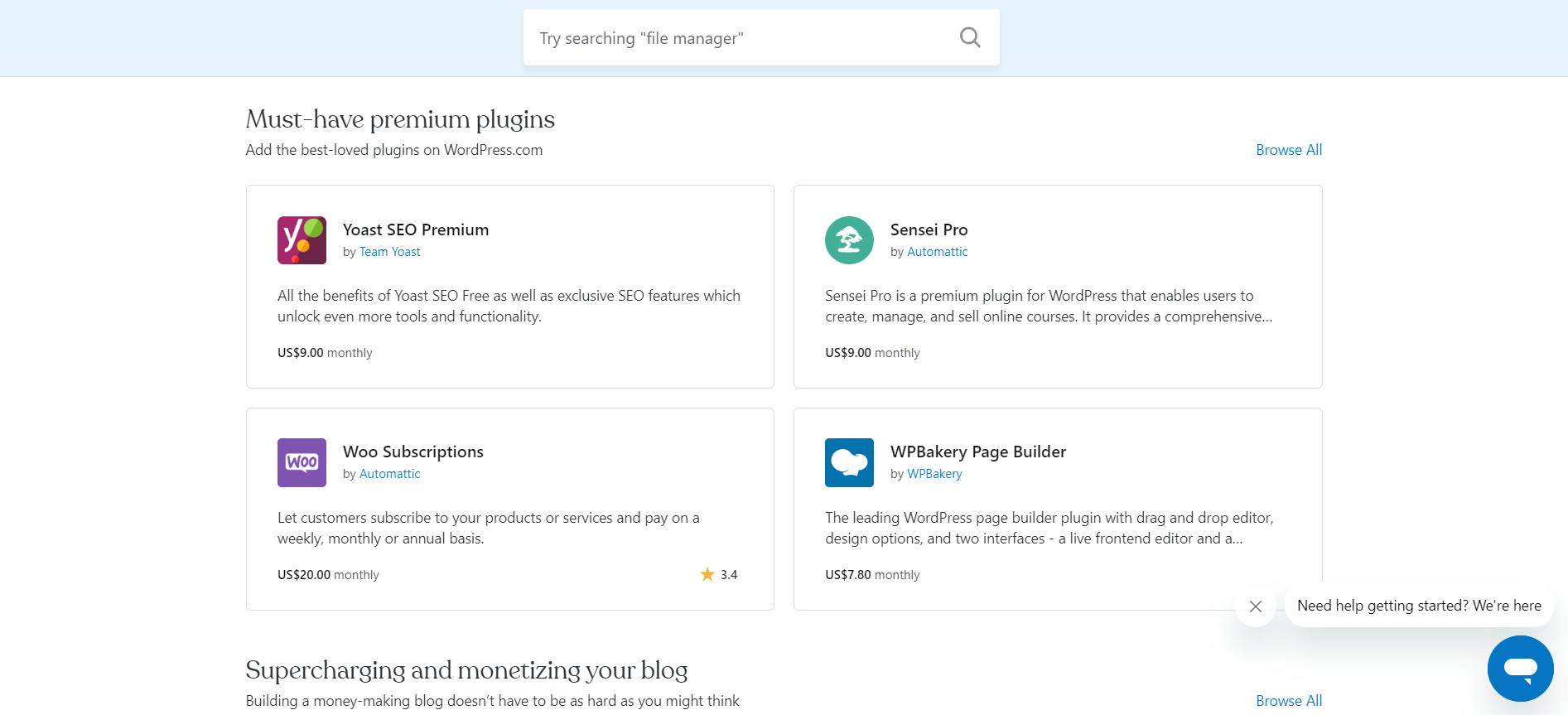
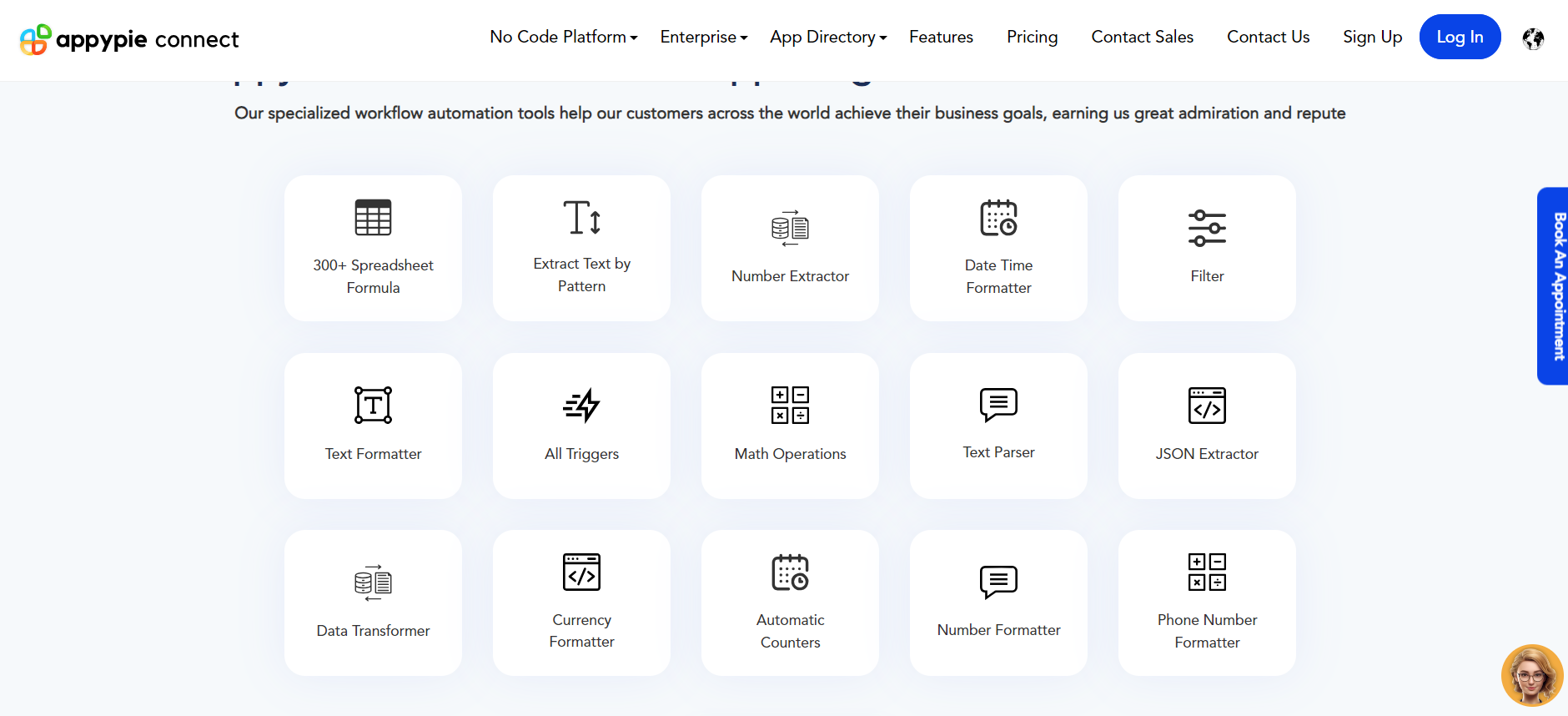
Marketing Features
Marketing featuresAssesses tools and options available for marketing.Score Components:
- SEO tools (40%): Effectiveness of SEO features.
- Marketing automation (30%): Availability and quality of marketing tools.
- Social Media integration (20%): Ease and depth of social media connectivity.
- Email marketing (10%): Quality and usability of email marketing tools.
 8.0
8.0
 7.5
7.5
🏆
Overall Winner: WordPress
. WordPress stands out for its extensive customization options through plugins, making it suitable for a wide range of marketing strategies. Appy Pie, while offering a similar set of features, is more focused on ease-of-use and quick deployment.

|

|
|
|---|---|---|
|
SEO Tools |
|
|
|
Email Marketing |
✓ (through plugins) |
|
|
Blogging |
|
|
|
Social Media Integration |
Plugins for direct linking, automatic posting, and social feeds display |
Simplifies content sharing and audience engagement on major social platforms |
|
Analytics and Reporting |
In-depth analysis via plugins like Google Analytics for WordPress |
Integration with Google Workspace may offer insights into web traffic and user behavior |
|
Ads and Promotions |
Support for Google Ads and ad management through various plugins |
Tools for creating and managing promotional content |
Customer Support
Customer supportEvaluates the quality and availability of support options.Score Components:
- Response time (40%): Speed of support responses.
- Support quality (30%): Effectiveness and helpfulness of the support.
- Availability (20%): Range of support channels (phone, chat, email).
- Resource richness (10%): Quality of self-help and educational materials.
 5.0
5.0
 8.2
8.2
🏆 Winner: Appy Pie
. With a customer support score of 8.2, Appy Pie outperforms WordPress, which has a score of 5.0. Appy Pie offers 24/7 customer support through various channels, including live chat, email, and phone. They also provide extensive documentation and tutorials on their website to help users troubleshoot common problems on their own.
On the other hand, WordPress, being an open-source platform, lacks direct customer support. Users can find assistance through community forums, the WordPress codex, hosting provider support, and plugin and theme support. However, this might not be as efficient and direct as the support provided by Appy Pie.
Security
SecurityLooks at the platforms’ security measures and data protection.Score Components:
- Data protection (40%): Safeguards for user and customer data.
- SSL and encryption (30%): Implementation of secure connections.
- Compliance (20%): Adherence to industry security standards.
- Regular updates (10%): Frequency of security updates and patches.
 6.7
6.7
 7.5
7.5
🏆
Winner: Appy Pie
. Appy Pie offers a more comprehensive security package compared to WordPress. It provides secure private data storage and protection, SSL encryption, regular security audits, and secure hosting. They also offer two-factor authentication and password protection for user accounts, ensuring that user data is safe and confidential.
WordPress, on the other hand, provides numerous functionalities and resources to enhance website security. However, the approach to private data storage and protection can vary depending on the hosting provider, which can be a concern for some users. Despite this, WordPress offers a wide range of plugins to bolster security, such as those for site backups, monitoring, malware scanning, user activity tracking, permission control, and spam protection tools.
AI Capabilities
AI capabilitiesMeasures the effectiveness of AI-driven features and tools.Score Components:
- Automation efficiency (40%): Impact of AI on streamlining processes.
- Personalization (30%): AI-driven customization for users or customers.
- AI-Assisted design (20%): Role of AI in website design and functionality.
- Data analysis (10%): Use of AI in interpreting user data and analytics.
 6.1
6.1
 7.2
7.2

|

|
|
|---|---|---|
|
AI Builder |
Lacks built-in AI, relies on plugins |
Built-in AI for automatic design and customization |
|
AI Ecommerce features |
Lacks built-in AI, relies on plugins |
Personalized shopping experiences, AI chatbots |
|
AI Content Generation |
Lacks built-in AI, relies on plugins |
Advanced AI algorithms for content creation |
|
Additional AI features |
Wide range of AI plugins and tools |
Chatbots, virtual assistants, AI analytics |
🏆 Winner: Appy Pie
. With a score of 7.2, Appy Pie’s built-in AI capabilities outshine WordPress’s plugin-dependent AI features. Appy Pie’s AI assists in website design, content creation, and ecommerce features, providing a more streamlined and efficient website building experience.
User Management
User ManagementAssesses the platforms’ capabilities in managing user roles, permissions, and accessibility.Score Components:
- Role Customization (40%): Flexibility in creating and defining user roles and
permissions. - Ease of Management (30%): User interface and tools for managing users.
- Access Control (20%): Effectiveness of access control measures for different user
levels. - Scalability (10%): Ability to manage a growing number of users efficiently.
 8.8
8.8
 7.3
7.3
🏆 Winner: WordPress
. Both WordPress and Appy Pie offer different levels of user management, but WordPress provides more flexibility and control.
- WordPress allows editing access based on user roles and additional controls. User roles, ranging from Super Admin to Subscriber, dictate the level of permissions, while plugins and controls such as role management plugins and revision control offer further customization for specific editing rights and collaboration.
- Appy Pie offers different user access levels based on the plan chosen. For the Free Plan, one user has full editing privileges. Paid plans include the Starter Plan (3 users), Hobby Plan (5 users), Professional Plan (10 users), and Enterprise Plan (unlimited users). Each plan designates an Admin with full access and additional Editors with varying editing rights. Additionally, paid plans allow for customization of roles, enabling tasks such as content editing or design adjustments.
WordPress User Roles and Access Levels:
| Role | Description | Access Highlights |
|---|---|---|
| Super Admin | Manages the entire network in WordPress Multisite. | Network admin, manage sites, users, plugins, themes. |
| Administrator | Full access within a single site. | Manage plugins, themes, users, all posts/pages. |
| Editor | Manages and publishes content, including others’ posts. | Edit/publish all posts, manage comments, categories. |
| Author | Publishes and manages their own posts. | Write, edit, publish own posts, upload files. |
| Contributor | Writes and edits their own posts but cannot publish. | Write, edit own posts (no file uploads or publishing). |
Additional Features

|

|
|
|---|---|---|
|
SSL Certificate |
|
|
|
Custom Domain |
|
|
|
Free Custom Domain Included |
|
|
|
International Domains |
|
|
|
Mobile Responsive |
|
|
|
Page Speed |
|
|
|
Website Builder Mobile App |
|
|
|
Convert a Website To An App |
|
|
|
Website Analytics |
|
|
|
Multilingual Sites |
|
|
|
Multiple Users |
|
|
User Feedback
WordPress is highly praised for its user-friendliness, cost-effectiveness, extensive themes and plugins, customization options, and supportive community. However, some users mention technical challenges, security concerns, a learning curve, and a lack of direct support. Despite these challenges, it remains a widely used and versatile platform, especially beneficial for startups and small businesses.
Appy Pie, on the other hand, receives positive feedback for its user-friendly interface and excellent customer support. It offers low-code solutions for app and website building without requiring coding experience. Users appreciate its ease of use, extensive features, and ability to create apps and websites quickly. While some users express a desire for more customization options and templates, overall, Appy Pie serves as a valuable tool for businesses and individuals seeking to create apps and websites efficiently, solving the problem of complex coding requirements and providing a platform for easy communication and engagement with users.
The making of this blog
We followed a clear, step-by-step process to write and research this article.
FAQ
Which platform is better for ecommerce, WordPress or Appy Pie?
Can I build an informational or business website with WordPress or Appy Pie?
How do WordPress and Appy Pie compare in terms of ease of use?
Which platform offers better customer support, WordPress or Appy Pie?
Are there any differences in the AI capabilities between WordPress and Appy Pie?
Which platform is more secure, WordPress or Appy Pie?
How do WordPress and Appy Pie handle website speed optimization?
Can I manage multiple users with WordPress or Appy Pie?










